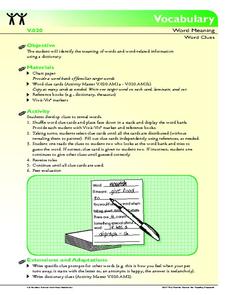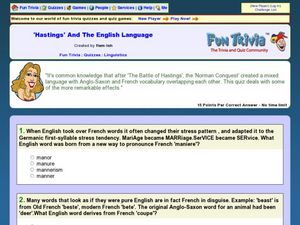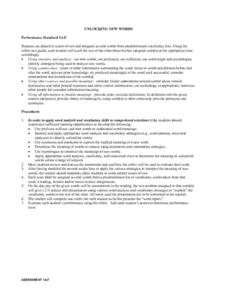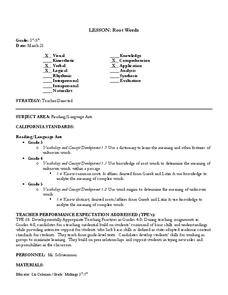Curated OER
Mythological Word Origins
No wonder the ship was called the Titanic. An investigation of Norse, Roman, and Greek Mythology provides insight into mythological characters and corresponding words in the English language. A close look at roots, prefixes, and suffixes...
Curated OER
Word Origins
Understanding a word's etymology can really help with decoding and building vocabulary skills. Readers compare and contrast words of similar origins but with different difficulty levels. They focus on prefixes, suffixes, and affixes....
Curated OER
Mythological Word Origins
Review myths and the characters therein, connecting them to vocabulary words in the English language today. Begin by searching online for myths and character names. With at least ten names that are familiar English words, students use...
Florida Center for Reading Research
Vocabulary: Word Meaning, Word Clues
Young learners develop a deeper understanding of target vocabulary. In pairs, pupils independently complete a series of word clue cards, asking them to find information about key terms, including their definitions, synonyms, antonyms,...
Curated OER
Spanish in English
What do the words alligator, armadillo, and cockroach all have in common? Each one is an English word with Spanish origins. Introduce young etymologists to the joys of discovering word origins with a lesson that asks them to create a...
Florida Center for Reading Research
Vocabulary: Word Meaning, Dictionary Digs
Young scholars dig through dictionaries to uncover the wealth of information they provide. Using the included graphic organizer, children learn about target words by finding their parts of speech, pronunciation, definition, synonyms, and...
Curated OER
Word Origins
Discuss where some words originated, how they are used today, and new words recently added to the dictionary. This short slide show is lacking in depth but could possibly work as a review.
Curated OER
Word Origins
Have you ever studied historical words and found that they were deeply rooted in racism or prejudice? Select a long list of these words to have your class examine. What familiar roots do they have? Do they know when this word originally...
Curated OER
'Hastings' and the English Language
Follow the development of the English language from its Anglo-Saxon roots. Various Germanic, Roman, and French words helped form our English vocabulary and are incorporated into this quiz. See how well you know the beginnings of English...
Wisconsin Family Assistance Center for Education
Sight Word Lists and Activities
Scholars examine newspaper articles and highlight two sight words to discover which appears more frequently. They then glue sight words onto paper to make flashcards before composing, writing, and creating picture representations of...
Curated OER
Word Up!
Study the importance of word choice in informational text. Middle and high schoolers locate unfamiliar words and phrases in newspaper articles of their choosing, and use online word sites to explore the definitions and histories of each....
Really Good Stuff
English/Spanish Cognates: Food
Everyone loves food! Help your English language learners pick up some vocabulary with a series of activities based around cognates and food. Pupils practice each word and focus on the words in-depth by filling out Frayer model...
Curated OER
Where Do Words Come From?
Students examine the foreign-language roots of various English words. Using the dictionary's word derivation notes and abbreviation key, they develop a list of words with a foreign-language origin, and create a class dictionary.
Curated OER
Unlocking New Words: Partner Presentations
Following extensive modeling about how to apply word analysis and vocabulary skills to learn new words, partner teams create brief word presentations to teach new vocabulary to the class. Preselect words from upcoming social studies,...
Saddleback College
The Wonder of Words
If your language arts students think etymology isn't relevant to their everyday lives, show them a presentation that will prove them wrong! The slideshow provides explanation about various words, roots, and suffixes that have adapted in...
EngageNY
Analyzing Word Choice: Understanding Working Conditions in the Mills
Ravenous or hungry, happy or ecstatic—why does word choice matter? Scholars continue to analyze working conditions in the mill and how the conditions affect the protagonist of Katherine Paterson's novel, Lyddie. They engage in a close...
Novelinks
The Color of Water: Word Square Instructions
Immaculate, accumulation, dissipation. Vocabulary drawn from chapter 16 of James McBride's memoir, The Color of Water, can prove to be challenge for readers. To help kids understand the meaning of these words and what they add to the...
Scholastic
Frindle Lesson Plan
"Who says a pen has to be called a pen? Why not call it a frindle?" Inspired by this quote from the award-winning novel written by Andrew Celements, this lesson allows children to invent their own terms for common classroom objects,...
Florida Center for Reading Research
Phonics: High Frequency Words, Memory Word Game
Play this fun adaptation of the game Memory. Young scholars flip over high-frequency word cards, read them aloud, and keep them if they match.
K12 Reader
Possessive Pronouns
It's mine! No, wait, it's yours! Have your class members practice possessive pronouns so they can properly name who an item belongs to. For this exercise, pupils choose the correct possessive pronouns to complete 12 sentences.
Tri-Valley Local Schools
Commonly Confused Words
Who gave you grammar homework? Or is it whom? Clarify the meanings of several commonly confused words, including affect and effect, among and between, and then and than with a handout and grammar practice activity.
Haut Gap Middle School
Root Words
Scholars demonstrate their knowledge of root words aqua and aud, and develop vocabulary skills by completing of a chart, handout, and worksheet using creative thinking skills, a dictionary, and a thesaurus.
EngageNY
Summarizing Complex Ideas: Comparing the Original UDHR and the "Plain Language" Version
The eighth lesson plan in this series continues the focus on vocabulary and increasing young readers' awareness of academic language. Pairs of learners participate in a short vocabulary review activity called Interactive Words in which...
Curated OER
Alphabetical Order
This is a vocabulary worksheet with a twist! Young elementary-schoolers put these 13 words into alphabetical order before finding their meanings, uses, and origins. They will need to use reference materials, and may need some help...

























